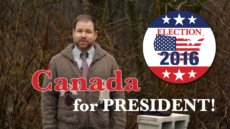A Canadian View of the U.S. Election

Give to love your hearth and hall.
But do not give advice at all.
-Phyllis McGinley
The American election is steadily drawing closer, and our new editor has suggested this essay might spend a few words about the Canadian Perspective. There are accepted boundaries of privacy in personal and domestic affairs. We all learn not to advise the husband about the wife, or vice versa, and people who intrude on other people’s parenting issues are regarded as an abomination. But what are the limits of privacy among nations? If a member of nation X suggests openly that he or she really really would prefer that nation Y would elect this person rather than that person: is this . . . rude?
The problem is sharpened when the nations involved are, in certain ways, closer than usual, as are Canada and the United States, who are economic and historical partners and share a lot ( but not all, no, not all) of culture. The republic and the dominion are as closely bound as Batman and Robin or Spike and Chester. Certainly a bald and unasked for suggestion that this person or that be elected is over the limit, but it may be permitted to talk about how it looks from across the border. That is in the indicative, not the imperative.
Two points seem worth consideration.
First, the political sentiments of Canadians as to Clinton vs Trump, are not really clear. Our best and brightest, that is, the government in power, higher academia, social activists, and the artistic community are 100% in the Democratic camp. This is patent, and it has been that way for a long time. The secret dream of the Canadian Intellectual is to be invited to write an essay for Philip Rahv (or whoever is his successor in these matters).
But what the mass of Canadians think, it is hard to tell. Dissent from the conservative side is tamped down here rather firmly. Publically expressed “bad-think” can, in some cases, lose you your job. Militant dissent is celebrated, but only when authorized and complaints are muted because there is an awful lot of deference to authority north of the border. Deference does not mean agreement, of course.
Anyway, from here in Toronto, the 2016 campaign gives us an odd sense of deja vu. We look south and see played out on an epic scale the same story we had in Toronto a few years ago.
Back then, we in Toronto were faced with a mayoral choice between, on one hand, a range of average, more or less establishment candidates (some a little left, some a little right) and on the other hand the late Robert Ford, the avatar of populist appetites. The papers were against him, the pundits were against him, all the nice people in town were against him. Astonishingly, he won. It was a textbook case of the choice between more-of-the-same and saying to hell with it and kicking over the traces. Suddenly things were altogether different. It might have been called a revolution, but we didn’t shoot anybody. Its not the Canadian way.
But the Canadian Psyche has mixed feelings about such goings on. Surrendering to an impulse like this is a dangerous business. We thought we were getting a rough hewn populist with a golden heart. What we got was a nation-wide embarrassment and four lost years.
We look back on that election, and we also recognize the extraordinary vehemence in political rhetoric. Officially, the Canadian policy is “talk nice.” That went by the boards. Both sides denounced each other in terms that recalled Ezekiel. When words get that heated, the suspicion arises that what is being argued about is not really…what is being argued about.
After all, no matter where we are, north or south, it is always a bad situation. As Jefferson said, a democracy is like a raft—hard to sink, but always leaving your feet wet. The option of pulling the red toggle switch out of sheer disgust is always there. The tension is always there.
What tips the balance between steady-as-it goes or go-for-broke? Policies? Policies come and go. Today we are at war with Oceania, tomorrow . . . ? ersonalities? If it were personality no one would elected personally objectionable people. But that happens all the time. The late Mayor Ford was one, and in spades. No, it seems more likely that personalities attract us as the embodiment of what we love, or hate. And that flows out of a vision of basic reality.
It is a matter of the moral atmospheres that Chesterton wrote about. Policies we can argue. Personalities we can hate or love. But the deep level of moral flavour is a matter for liking or distaste, and in these cases everything is unforgiveable. It touches on the poetic, the unheimlich sense that there is a purposeful reality guiding and musicalizing (to use Valery’s term) the phenomena.
A Final Note
This will be the last essay from me or a while. We would like to express our thanks to the Voegelinview and to the readership for this opportunity. A bound volume (a handbound volume) of the collected essays from this spot is available for $20.00 plus $10 postage (Canadian or American—cheques or money orders only). All proceeds to buy children’s books for Christmas boxes. Please email to [email protected].




